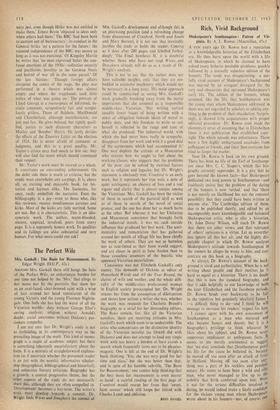The Perfect Wife
AROUND Mrs. Gaskell there still hangs the halo of the Perfect Wife, an unfortunate burden for our time not helped by the 'Mrs.' that clings to her name nor by the portraits that show her as an oval-faced, clear-browed saint with a wisp of lace around her head reminiscent of the young Victoria and the young Florence Nightin- gale. One feels she has had the worst of all the Victorian worlds: duty without George Eliot's saving analysis; religion without Arnold's doubt; social awareness without Dickens's pas- sionate sympathy.
I am not sure that Dr. Wright's study is not as forbidding in its contemporary way as the prevailing image of the work. This kind of mono- graph is a staple of academic output, but there is something inherently unsatisfactory about the form. It is a mixture of straightforward explana- tion (as if uncertain whether the presumed reader is au fait with the novels), informative scholar- ship (biographical, bibliographical and historical), and subjective literary criticism. Biography has a growth, a central progressive theme, but the other aspects of the study do not necessarily share this, although they are often compelled to. 'Development' becomes a key-term. The writer's work must develop towards a summit, Dr. Wright finds Wives and Daughters the summit of
Mrs.. Gaskell's development and although this is an interesting position (and a refreshing change from discussions of Cranford, North and South and Mary Barton), it is not one that, inevitably justifies the study or holds the reader. Coming as it does after 200 pages and labelled forbid- dingly `The Final Synthesis II,' it is doubtful whether those who have not read Wives, and Daughters already will do so as a result of Dr. Wright's analysis.
This is not to say that the author does not have valuable insights, only that they arc em- bedded in extensive machinery which would not be necessary in a long essay. His main approach could be summarised as seeing Mrs. Gaskell's work gradually breaking away from the moral imperatives that she assumed as a responsible middle-class Victorian. 'Her writing carried steadily fewer traces of being written with a sense of obligation towards ideals of moral or public duty, and this freedom to write to suit. herself is reflected in the range and done of what she produced. The industrial world, with which she had never been really in sympathy, disappears from her work and with it a good deal of the earnestness which had accompanied it.' One may deplore the attitude of a Mancunian who stresses how we ought to feel about the working classes, who suggests that the problems of the poor can be solved by external factors such as religion and legacies, but Dr. Wright's statement is obviously true. Cranford is an early work, but it represents her true vein, a note of quiet astringency, an absence of fuss and a real vigour and clarity that is almost unique among the Victorians. Mrs. Gaskell has been the victim of those in search of the pastoral idyll as well as of those in search of the novel of social protest, and the one has done her as much harm as the other. But whereas it was her Unitarian and Mancunian conscience that brought forth the industrial novels, it was no such outside influence that produced her best work. The senti- mentality and romanticism that has gathered around her novels of village life has been chiefly the work of others. They are not as harmless nor as rose-tinted as their fame would suggest, and are closer in spirit to Jane Austen than to those countless inventors of the bucolic who appeased Victorian materialism.
Conscience was not Elizabeth Gaskell's only enemy. The demands of Dickens as editor of Household Words and All the Year Round, the claims of wife and mother, and the whole diffi- culty of the middle-class professional woman in English society preoccupied her. Dr. Wright rescues her from the assumption of dilettantism and shows how serious a writer she was, whether the work was research for Charlotte Brontd's biography or a serial for her demanding editors. The flaws remain, for, like all the Victorian novelists, there are recurring attitudes in Mrs.
Gaskell's work which seem to us undesirable. The critic who concentrates on the distinctive identity of the Victorian novelist (as Orwell did with Dickens) and does not attempt to load any single work with too heavy a burden at least avoids a search which frequently turns out to be phantas- magoric. One is left at the end of Dr. Wright's book thinking, 'Yes, she was very good for her time and class,' but she was better than that, and in spite of his humble sub-title, 'The Basis for Reassessment,' one cannot help thinking- that the best basis for reassessment is even nearer to hand: a careful reading of the first page of Cranford would rescue her from that 'sweet, faint savour' which still keeps her linked with Charles Lamb and oblivion.
JOHN DANIEL






























 Previous page
Previous page